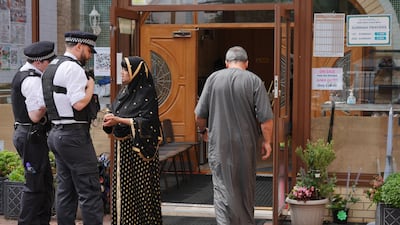More than 80 per cent of victims of hate crimes since the summer riots that spread across the UK have not reported them, a survey has found.
In polls conducted by the Women’s Muslim Network charity, almost one fifth of the 200 people interviewed said they had encountered hostility since the riots, which were marked by violence against migrants and Muslim communities in towns across the country and have led to scores of people being jailed.
The charity’s chief executive, Shaista Gohir, has presented the report, titled Anti-Muslim hate: Concerns and Experiences, to Prime Minister Keir Starmer and asked the government to respond to its findings.
Hate crime numbers
Since the Home Office began collecting comparable data on hate crime in the year ending March 2013, it has increased each year except in 2020/21, when a decrease was recorded during the height of the Covid pandemic.
Annual police data for regions across England and Wales shows that where the perceived religion of the victim is recorded, Muslims are the most targeted faith group and make up between 42 per cent and 50 per cent of religious hate crime offences.
“As hate incidents are underreported, the actual number of offences are likely to be much higher,” Baroness Gohir said.
The people interviewed were asked how worried they were about their safety and that of their families, and 75 per cent of the abuse was delivered while outdoors, in the street, park or at a bus stop.
Before the recent riots, only 17 per cent were very worried, and 14 per cent were fairly worried. However, following the riots, the number of those very worried skyrocketed to 73 per cent, with 14 per cent still fairly worried, making a total of 87 per cent who were worried.
“The findings indicate that Muslims are aware of what constitutes a hate crime, but the police may be minimising their reported experiences of hostility, often failing to record these incidents as hate crimes,” Baroness Gohir wrote in the report.
“Decisions made by police officers may be influenced by their own negative biases towards Muslims. It seems that the legal institutions and government do not fully recognise or address anti-Muslim hate crimes, leaving Muslim communities feeling unprotected by the systems meant to safeguard them. This appears to be contributing to the underreporting of hate incidents.”
There has been a surge in reports to the charity's helpline since the UK was rocked by this summer's rioting, following false information circulating online that the suspect in a fatal stabbing of three young girls was a Muslim asylum seeker.
“This wave of hatred left many Muslims shocked and traumatised. Muslim women, in particular, began reaching out to Muslim Women’s Network UK (MWNUK), seeking a safe space to process the events,” Baroness Gohir said. “In response, MWNUK launched a survey to gather the experiences, concerns and fears of Muslim men and women.”
“Feelings of anxiety and vulnerability were commonly expressed. Many respondents mentioned that they now check in on family and friends more frequently, particularly elderly parents and children.
“Some admitted they were too frightened to go out after witnessing images of the riots. Others reported altering their behaviours and lifestyles, such as avoiding public transport or local parks or changing the way they dressed such as not wearing a black headscarf. Several respondents also shared that they no longer feel safe going out alone.
Frequency of anti-Muslim hate experiences
Of those who experienced hate incidents, 82 per cent said these had taken place within the past five years. However, many were more recent, with 18 per cent experiencing hostility within one week of the riots.
Almost half of those surveyed said they were subjected to hostility in the street and 84 per cent experienced direct verbal abuse.
“Alarmingly, one in four had encountered hostility between five to 10 times, and one in 10 had experienced it more than 10 times, highlighting the widespread prevalence of hate crimes,” Baroness Gohir said.
Online abuse
Respondents were asked how worried they were about their online safety.
Before the recent riots, only 12 per cent were very worried and 13 per cent fairly worried. However, after the violence, the number of those very worried increased to 36 per cent, with 28 per cent fairly worried.
“Many Muslims mentioned that they either didn’t use social media often, had reduced their usage, or were very cautious, opting to use privacy settings and primarily interacting with people they knew,” Baroness Gohir said.
“Several expressed concerns about the toxicity of social media, noting that they had encountered racist and Islamophobic comments. They were particularly worried that such comments remained on platforms even after being reported, fearing that this could lead to increased offline hatred.”
Government promises swift action
Baroness Gohir, a life peer, has urged the government to strengthen hate crime legislation and wants a campaign to encourage women to report it.
Lord Khan of Burnley, the parliamentary undersecretary for housing, communities and local government, told the House of Lords in response to the report: “Anti-Muslim hatred is abhorrent and has no place in society. We will continue to take swift action, including to safeguard Muslim women.
“We are absolutely committed to tackling Islamophobia. During our government of only 10 weeks I have crossed the country from Southport to Sunderland to hear directly from communities, with more planned.
"I’m deeply saddened by the recent horrific scenes causing hateful attacks causing Muslims fear. We are refreshing our strategic approach to tacking all forms of hatred, including Islamophobia, and will update the house shortly.”











